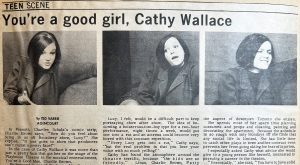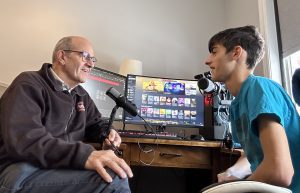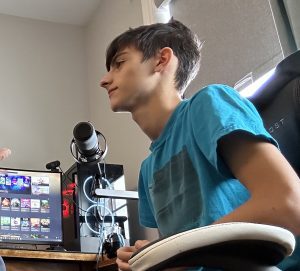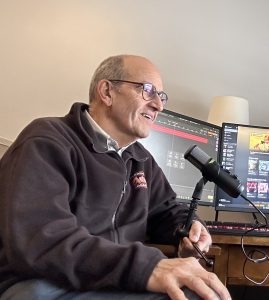
We sat backstage at the Playhouse Theatre in Toronto. A few years earlier, we’d attended the same high school, but by the time we met professionally 57 years ago, actor Cathy Wallace had trained at the Banff School of Fine Arts and appeared off-Broadway in Bye Bye Birdie and in You’re a Good Man, Charlie Brown. And she was my first-ever professional interviewee. I pressed the record button on my reel-to-reel tape recorder and asked an obvious question.
“How do you feel about playing Lucy in an off-Broadway show?”
“It just goes to show that producers can’t resist a pretty face,” she quipped. Any tension I felt evaporated, and we were off on a fun chat.
That conversation with up-and-coming performer Wallace, in April 1968, proved to be my first-ever interview of consequence for a short feature published in the then Agincourt Mirror newspaper. The few bucks I was paid are long since gone. But I still have the clipping in a scrapbook.
And hundreds of features, thousands of interviews and 57 years later, I still remember the fear of asking the right questions and getting the best story for publication.

Last week, I revisited that moment – from the other side of the microphone – when my grandson, Sawyer, asked if I’d be his interview subject as an assignment for his Grade 9 English class. I jumped at the chance. The difference, of course, was that today these things are called podcasts; they’re recorded on computers, not clunky old tape recorders; and in this case, it was his turn to feel nervous. I admit to feeling some apprehension myself, that I shouldn’t overwhelm him with my experience and that I should let him be in control.
Informally, like my interview with Cathy Wallace on a couch backstage at the Playhouse Theatre in 1968, Sawyer interviewed me in front of the computer on a desk in his bedroom. I’d brought along a brand-new microphone so that we each could speak into a separate mic, but when our two microphones ended up competing with each other, he decided we should just share one.
As I’d hoped, he took control. Further, he’d drafted a list of about a dozen questions and allowed me to preview them. I asked him how long the interview had to be for the assignment and suggested rather than try to cover all the questions, that he pick a handful. He did and then clicked the record button.

“How would you describe what you do?” he asked.
“Well, when I started in journalism and broadcasting, we called it freelancing,” and I realized I had to put that into terms his generation could understand. “You call it the gig economy, I think.”
He nodded and listened to my explanation. Now, I don’t know how many of you have conversed about the gig economy with a 15-year-old, but he listened attentively (by the way, he didn’t make the mistake of a lot of interviewers by saying “Uhuh. Uhuh,” overtop of my answers).
I explained about not working as an employee, not having a regular paycheque, working based on individual jobs on contracts with media outlets, such as newspapers, magazines, radio and television and book publishers.
“So, how do those contracts work?”

Good question. And it wasn’t one from his list of prepared questions. Later when he asked me what it meant to receive the Order of Canada, I tried to explain how surprised I was, how honoured I felt, how humbling being in a room of so many fascinating Canadians.
“You mean anyone can receive the Order of Canada?” he asked. Another good question. And I beamed a bit more proudly knowing that my podcast host isn’t just a good technician; he’s also a good listener.
When our interview – no, it really was more of a conversation, probably the longest he and I have ever experienced – was done, I asked what else he’d planned for the podcast. He played me one of the advertisements he’d created for partway through the program.
And we talked about how to tease the audience about what was coming in the next segment and how to invite audience feedback at the end of the podcast. “You mean like how to get in touch with me?” I nodded and said, “I think you’ve got this podcast thing.”
When the Agincourt Mirror published my freelance feature about Cathy Wallace co-starring in You’re a Good Man, Charlie Brown, it was the lead story in the “Teen Scene” section of the paper. I felt really chuffed.
A podcast interview with my grandson feels even more rewarding.